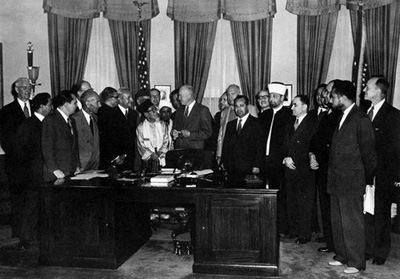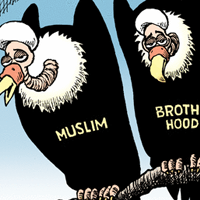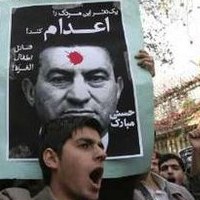![]()
Fri, Nov 11, 2011 | Rubin Reports | By Barry Rubin

President Dwight D. Eisenhower in the Oval Office with a group of Muslim delegates, 1953. Muslim Brotherhood representative Said Ramadan (son-in-law of Hassan al-Banna, founder of the Muslim Brotherhood) is second from the right. His son, Tariq Ramadan, is a prominent Muslim Brotherhood advocate in the West.
U.S. Political Engineering in the Middle East: Its Already Created Disaster Once Before
Few realize how U.S. policy at the start of the radical Islamist era in Middle East history parallels that prevailing during the beginning of the previous, Arab nationalist, era that began in the 1950s. Briefly, American policymakers at that time believed that Arab nationalist military officers would be moderate, pro-Western, enhance stability, and fight totalitarianism.
Today, the policymakers expect that revolutionary Islamism will do the same thing. More than a half-century ago, though, there was no public debate (or even knowledge) of what was happening. Equally, American and European leaders only played a minor role in the launching of six wasted decades of dictatorship, war, terrorism, hatred, and stagnation. Today, they are playing major roles as enablers.
During the early 1950s, there were understandably great fears that communism and Soviet influence would spread throughout the Middle East. And so some liberal strategists argued that the solution was to be found in a “third alternative”: efficient moderate secular nationalist movements that would replace the old, corrupt, unpopular regimes but would not become part of the communist bloc. The new regimes would win the people’s loyalty, modernize the countries and raise living standards. And who in a country like, say, Egypt could do this? What was the most efficient and modernized of institutions in the Arab world able to achieve this result? The army.
This involvement shouldn’t be overstated. But the U.S. government did accept the idea and the CIA was tasked to implement this policy. Certainly, in Iran and Guatemala during the 1950s, the U.S. government feared — with good reason — that the local liberal nationalist forces were too close to Communism and supported coups against them. But all the more reason, went the argument, that the United States needed its own form of non-Communist liberal nationalism.
Many years ago, I tracked down all the former staff members of the U.S. embassy in Cairo from 1952 that I could find. I particularly remember my conversation with a former, long retired, deputy military attaché who told me of what happened to him in the early morning hours of July 23, 1952.
He was awakened from sleep by a loud pounding on his door (security arrangements were less impressive in those days). It was one of his friends from the Egyptian army who, without even saying hello, breathlessly yelled in an excited voice:
“We have seized control of the government! We’ve taken over the radio station!” Then, he paused, calmed down, and asked with some embarrassment, “May I come in?”
By the way, this man later became head of the left-wing faction of the military regime, supported the Soviet, and was purged by President Anwar al-Sadat in the early 1970s.
There were also murky U.S. connections with the Syrian army and its political ambitions at the time.
The U.S. government, however, only played a tiny role in the Arab nationalist takeovers of that area. Soon it became clear that the new Egyptian government was radical, anti-Western, and the biggest threat to regional stability. Oh, and it also allied itself quickly with the Soviets. In other words, the U.S. effort to create a moderate new kind of regime to be the West’s friend, promote stability, and fight Communism in the Middle East resulted in creating a radical new kind of regime that was the West’s enemy, the USSR’s friend, and the source of instability in the region.
True, the Eisenhower Administration soon wised up. It’s possible to provide the precise date. On April 1, 1955, a State Department paper set out the new U.S. policy. Egypt was threatening America’s friends in the region — notably Saudi Arabia — and thus American strategy must be to align with the non-radical regimes against the new pro-Soviet ones.
Israel wasn’t on the list of friends as the U.S.-Israel relationship was minimal. That didn’t prevent the Arabs from hating America. By the way, there’s a neat cable from the U.S. Embassy in Damascus from about that time noting the beginning of Syrian television. Naturally, the cable said humorously, the starting program was an anti-American one.
Despite making serious errors — including saving the radical Egyptian regime from being overthrown by Britain, France, and Israel in the 1956 Suez war — the Eisenhower Administration and contemporary experts quickly grasped the nature of the threat and took measure to deal with it.
In addition, the Eisenhower and Truman administration could be excused because they had no experience with a brand new phenomenon. Yet today such a rationale doesn’t exist.
Bottom line: The United States did not create the monster that did to the Middle East during the second half of the twentieth century what Godzilla did to Tokyo, but it certainly took him out to lunch and gave him a few high-fives before figuring out where all the corpses and flattened buildings came from.
Fast forward to today. The Obama Administration thinks it is going to create a new type of regime, the modern Muslim democracy. It hopes these governments will promote stability, be friendly to the West, and fight the “real” dangerous Islamists, a category that seems almost totally restricted to al-Qaida. This time, the U.S. government is supposedly helping the “nice” revolutionary Islamists.
Another factor making the Truman and Eisenhower management better than that of Obama is that the Egyptian Free Officers had not cheered terror attacks on America (September 11) or spoke incessantly about committing genocide against Israel before they got into power.
Finally, a lot of the radicalism and ambitions had gone out of Arab nationalism by the late 1970s. The regimes settled down to being dictatorships that rewarded their elites, much as had happened in the USSR. Still, we shouldn’t exaggerate their middle-aged passivity or cynicism. Saddam Hussein did invade Iran, Kuwait, and fire missiles at Israel. The Syrian regime backed terrorism, sought to control Lebanon, and struggled against U.S. interests and Israel’s existence. As for Arab nationalist ideas, the “Arab” part kept them meddling in the region and undermining a “normal” state situation, while the nationalist part mobilized popular support.
Remarkable, isn’t it, that there has been no serious discussion concerning the earlier phase of failed policy, nor of how key experts and government officials argued at the time that Iran’s revolution would lead to what we’d today call “moderate Islam?”
True, the Islamists might settle down into growing fat on corruption and cynical about their own slogans. Still, that could take decades. How many people will die? How many billions of dollars will be wasted? How many lives wrecked and development stifled?
In Iran, there certainly has been a lot of elite corruption and caution on foreign policy. But that doesn’t mean Tehran, after almost one-third of a century of Islamist rule, has been turned into a tame pussycat either. Remember that drive for nuclear weapons.



 RSS
RSS









U.S. Political Engineering in the Middle East: Its Already Created Disaster Once Before | Middle Eas http://t.co/mgPhTr3a
U.S. Political Engineering in the Middle East: Its Already Created Disaster Once Before | Middle Eas http://t.co/mgPhTr3a
Powerful American families are the beneficial of that policy
For the last sixty years the US benefited from cheap Saudi and Arabs oil. In last twenty years that benefit went to few American families instead of American people thanks to walls street monopolization.
The US resources are used to guard the Arabs but the benefit goes to American individual not the country. The US economy is going down while the owners of oil companies are getting wealthier. Is Jewish bankers are partner in the wealth monopolization or not.
America is going through changes. The outcomes are unpredictable. The US congress must do something about it before it is to late.
Hamma Mirwaisi
Member of the Kurdistan National Congress (KNK),
Representative of KNK in America
And the author of the book, “Return of the Medes”.